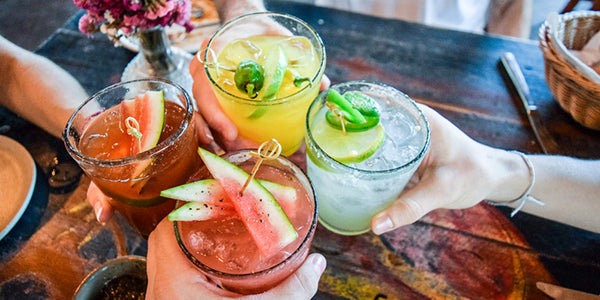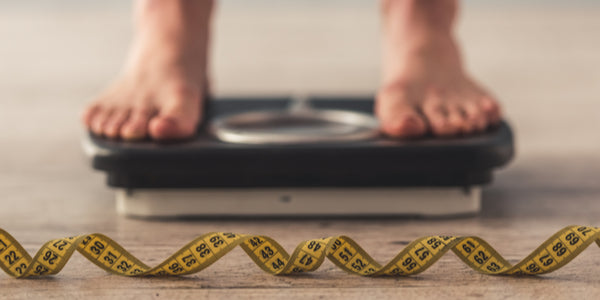
1. Neglecting Your Diet On the Weekends
You work so hard to balance a heavy workload and a healthy lifestyle throughout the week, so why unravel your efforts on the weekend? Yes, weekends are meant to be enjoyed but think of this broadly speaking scenario:
Friday comes and you head to a happy hour and indulge on a couple margaritas and chips and salsa with your coworkers. You are confronted with a get-together Saturday and not to mention, that birthday party you have on Sunday…
Continuously having that pattern can cause weight gain, as those Friday, Saturday, and Sunday occasions comprise over 40 percent of your week!
So rather than neglecting your diet on the weekends, try to find a balance of allowing yourself a modest piece of birthday cake and eating nutritious foods to satisfy both your body and taste buds.
2. Drinking Liquid Calories
Speaking of margaritas…
Go easy on alcoholic beverages, soft drinks, concentrated fruit juices, syrupy coffee drinks, and other high-sugar beverages. These sort of drinks are often devoid of any sort of nutritional value and pack on empty calories.
So rather than drinking your calories, don’t forget about case in point #3…
3. Forgetting About Hydration
While you might have your diet squared away, you might be pouring out your efforts if you regularly forget about hydration.
Keeping hydrated is key for not only overall health, but a well-known weight management technique, as water supports a healthy metabolism and helps regulate hunger levels.
Aim to drink a glass before and during mealtimes, along with a minimum of 64-ounces of water daily. Don’t love the flavor of water? Make it taste better by adding fresh herbs, fruits, and other palatable mix-ins.
4. Slathering on the Salad Dressing
From the chopped veggies to the shredded rotisserie chicken, salads are often the go-to "diet food" for weight loss. But week-in and week-out of countless salads, you find yourself staying stagnant on the scale or patterning weight gain.
Unfortunately, salads can unknowingly by fattening foods to gain weight, particularly related to an overflow of heavy dressings and croutons.
Keep your salad in top nutritional shape by preparing your own oil-based dressing or using the "dip" method, in which you dip the greens into a dressing to lessen the risk of over pouring.
5. Chowing Down Too Fast
Did you know it takes the brain and belly about 20 minutes to connect the "I’m full" feeling? Needless to say, eating too quickly and not allowing the time for the satiation feeling to register can cause you to overeat.
Slow down at mealtimes by sipping on water throughout, chewing thoroughly (sing the ABC’s with each bite if need be), and sitting at the kitchen table during mealtimes.
6. Cutting Sleep Short
While you likely feel the negative, groggy repercussions of an ill night’s sleep, you may not realize just how miscounting those Zzz’s can impact your weight.
Inadequate sleep is a risk factor for weight gain related to a number of causes, including slowing down metabolism, reducing energy to be active throughout the day, and intensifying cravings towards high-fat and sugary foods.
Ultimately, adults are encouraged to sleep between seven to nine hours on a nightly basis.
7. Letting the Little Things Get to You
Whether irked by a work meeting or aggravated with your spouse, constantly letting the little things get to you can be causing weight gain. (Or at least making it difficult to shed it off…)
Stress is a well-known culprit of weight gain, as it triggers a biochemical process where our bodies go into survival mode. During times of stress, our bodies store fuel and energy, slow down metabolism and dump out harmful chemicals such as cortisol. which are very likely to contribute to weight gain in the abdominal region.
If that’s not bad enough, stress eaters tend to prefer high-carbohydrate foods because these foods trigger an increase in the brain chemical serotonin, which gives the body a calming effect - almost like self-medication.
Learn to let things go and keep equipped with healthy coping mechanisms, including deep breathing, meditation, or simply taking a walk out in nature.
8. Heading to the Store Without a Grocery List
Going to the store without a grocery list might seem minor, though doing so can have weighty repercussions…
Taking the extra bit of time to plan out meals and formulate a grocery list can help you keep on track and lower the risk of impulse buys. (No thanks, XL frozen pizza box!)
But in addition to bringing a grocery list, also do not go to the store hungry, as feeling ravenous heightens the likelihood of succumbing to tempting (and often innutritious foods). Sticking to the store’s perimeter likewise helps fill your cart with nutrient-dense foods, as fresh produce, lean meats, seafood, and milk and dairy products tend to reside out the outskirts.
9. Thinking It’s Always Hunger
Feel like you need that snack or forth meal? While you might actually feel hungry, it is important to verify whether or not you truly are.
In fact, hunger is often mistaken for thirst and emotions tend to drive cravings. So rather than heading to the pantry, first drink a glass of water or head out for a quick walk. After doing so, reevaluate, as hunger never truly goes away.
10. Eating On Large Dining Ware
Casually known as the "large plate mistake," eating off large dining ware could be leading to weight gain.
The concept matter-of-factly proposes large dinner plates distorts the perception of appropriate portion sizes, thus increasing the likelihood of overeating.
Researchers explaining the large plate mistakes suggest, "We can take advantage of this visual "trick" by manipulating the dinnerware we use to serve various foods. Healthy foods such as fresh vegetables should be served in larger plates to encourage consumption, while less healthy foods should be served from smaller plates to trick our sweet tooth into feeling satisfied with less."
11. Eating in Front of the Television
In addition to the "large plate mistake," eating in front of the television increases the tendency of overeating, especially on high-fat and sugary foods.
As previously mentioned, sitting at a kitchen table can help you slow down at mealtimes, particularly by mitigating distractions and urging consumers to enjoy the meal in front of and company surrounding you.
If you are desiring a snack for your next movie night, keep healthier options on deck, including popcorn and carrot sticks and hummus. And instead of bringing the chip bag to the living room, ration an appropriate portion in the kitchen before heading to the couch.
12. Forgetting to Take Your Multivitamin
While there may not be a magic pill to weight loss, taking a multivitamin may be beneficial to your efforts! In fact, a study published in the International Journal of Obesity suggests multivitamin and mineral supplementation could reduce body weight and improve lipid profiles, including LDL and HDL cholesterol levels.
The outcome may be related to increased energy expenditure and fat oxidation, processes that may be compromised if nutrients are deficient.
Increase your likelihood of taking your multivitamin by placing it in a convenient spot, including by your morning coffee or toothbrush and paste.
13. Your Work Culture
Though your work accomplishments are gaining momentum, little did you know your company culture might be causing you to also gain much more.
Think about it: The candy dish you grab out of daily, the donuts at meetings, and the regular happy hours…
Take notice of these sort of circumstances and try to gain control, particularly by redirecting yourself from the candy dish and filling up on a nutritious breakfast before being overly tempted by donuts. Furthermore, try to healthify your work climate by encouraging walk meetings, fitness classes with coworkers, and providing a fruit basket.







